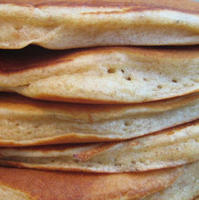 A summer poetry workshop reveals the value of exposure to poets working diligently outside the academy. And the best way to make whole wheat pancakes.
A summer poetry workshop reveals the value of exposure to poets working diligently outside the academy. And the best way to make whole wheat pancakes.
By Nica Franklin
Artist Development Fellow
Nica Franklin ’18 is a resident of Quincy House concentrating in Philosophy. He was awarded an Office for the Arts Artist Development Fellowship to attend the Skidmore College summer writers' workshop for poetry. Franklin currently serves as the poetry editor for The Harvard Advocate, and has also worked as the assistant to managing editor for the Religious Studies Review: Philosophy of Religion and the editorial intern for Penguin Random House Canada. His work has been published in the Religious Studies Review, Mr. Robot and Philosophy and The Harvard Advocate. He plans to pursue an MFA in poetry. He wrote the following about his summer experiences with whole wheat pancakes, poetry and post-academic adults.
As an OFA Artist Development Fellowship recipient, I attended the New York State Summer Writers’ Institute workshop for poetry in Saratoga Springs, New York. During the second week of my workshop, poet Vijay Seshadri, our professor for the week, explained to the class how to make whole wheat pancakes. Not just how to make them, but how to make them correctly, according to him. At the time, I didn’t pay much attention to this; I didn’t expect to be making pancakes of this sort anytime soon, or at all. But, looking back, it seems to function adequately as an emblem of my time at the institute.
Seshadri was giving a critique of a student poem, a poem which was attempting to weave two narratives together. He didn’t think the poem worked. It was like making whole wheat pancakes, he said, badly. Whole wheat pancakes, if you make them like you think you should are going to be too thick and dense, he said, roughly, like this poem. They need air inside, little air bubbles. What you need to do is separate the egg whites from the yolks, beat the whites, add them to the mix, and then add the yolk, Seshadri added, loosely. This will make them sufficiently full of air. Then make the pancakes. And serve with jam and sour cream. This was important. He was quite serious about it, about all this.
He wanted to teach us how to make these pancakes. It would help us, regardless of the poem we were discussing. And we should eat them in Vermont. I hopefully won’t be making whole wheat pancakes in Vermont with sour cream, but this notion of necessary separation in order to achieve the right balance of air and whole wheat worked well as a framing mechanism for my OFA project. At the Writers’ Institute, I was given a chance to work solely on reading, writing and listening to readings of poetry: a marked break from my usual life, which is mixed with academic work, or more academic work, so to speak. Though, at the time, because of the fellowship, I could steer clear of making Seshadri’s pancakes, metaphorically, it nonetheless gave me an interesting perspective for the time after I leave. Some notion of mental separation, holding two things in two hands at once.
During my time at the Writers’ Institute, one of the things I most wanted to come to understand was what this sort of life is like (not as a writer so much as a student of solely creative writing). In all, I didn’t entirely get a grasp of this, but something I was able to come to see was the lives of some of the people who did do this, namely, other, older students in the program. Many of the other students in the program were more advanced, in some sense, in craft and in age. And getting to interact with them was one of the most interesting aspects of my time there.
I quickly came to understand that while poetry does seem to take over these peoples’ lives, they nonetheless managed to cover quite a bit of ground. I met musicians, lawyers, ad writers and others, all who were students, many of whom were currently in MFA programs. But, I think, what was of most interest to me was the experience of interacting fundamentally with these people as peers. I didn’t realize that most of my life I don’t much interact with post-educational adults on an equal, working level. Most people around me are institutional superiors or family. Yet, here there was surprisingly little difference.
Aside from providing me – one would hope – with some sort of life skill, interpersonal skill or other idiomatic advancement, this heretofore unexperienced environment gave me a real opportunity for artistic growth, as if taken seriously by others and, indeed, myself.